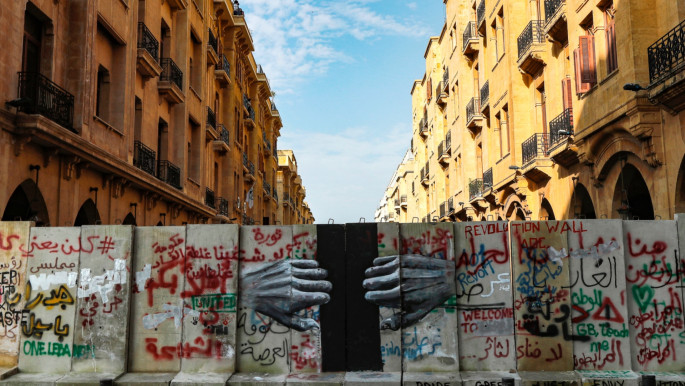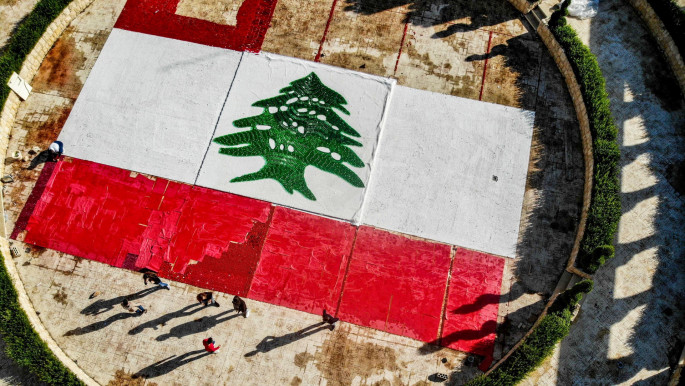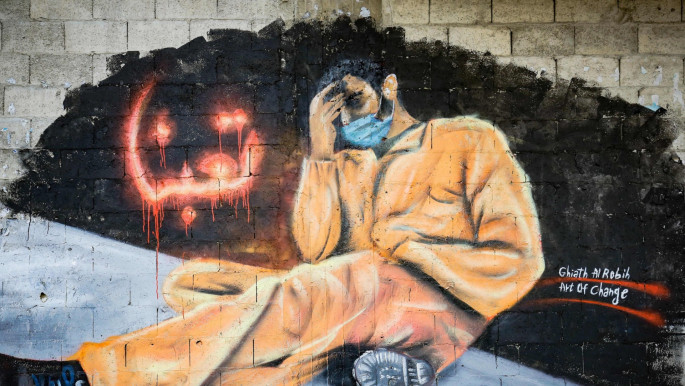How Lebanon's supermarkets became a frontline in the fight to survive the economic crisis
Many staples like subsidised milk, rice, sugar and cooking oil are hard to find, with fights among customers sporadically breaking out and constant tensions between customers and store managers.
"The crisis has been worsening a lot and that's very visible in food stores," Batoul Yazbek, a Beirut-based law student, told The New Arab. "The viral images on social media showing the Lebanese fighting over basics are by now familiar to the outside world".
The young woman stressed that in the early stages of Lebanon's revolution, in October 2019, prices rose but "not exponentially like now".
Besides studying, Yazbek is a part-time waitress and freelance journalist. The financial collapse in the small Mediterranean state began to affect her when she saw her wages rapidly lose their value at the start of last year.
To make things even more difficult, with the outbreak of the coronavirus pandemic the restaurant where she works has been shut down on and off as part of nationwide lockdown restrictions. As Lebanon went into a strict new lockdown last January, her workplace has remained closed ever since.
 |
Lebanese citizens have seen their living standards deteriorate sharply since a political and economic crisis hit their country in late 2019, sparked by a shortage of foreign currencies and decades of government corruption |  |
Her life as a university student and precarious worker has got harder and harder, having to stick to a very tight budget. She goes grocery shopping early in the morning to buy whatever she can afford day by day, and never has extra money to get more supplies.
"Everything is so expensive! I can't even cook pasta, just a jar of tomato sauce would cost me 15,000 LBP ($10), it's too much," the 19-year-old said. "One day I ordered a two-course meal that came to 50,000 LPB ($33) which was a shock".
"My social life is more modest than before, I can only buy second-hand clothing, and I've had to cut down on smoking", she continued.
Back in October 2019, Hilda Karam, 43, a senior bank employee and mother of a young child, could anticipate to a degree the deepening economic downturn given the nature of her job. She expected a shortage in groceries and further price hikes.
 |
|
| Read more: Lebanon's lost generation grapples with a bleak future |
"We knew a dark period would come," she said while speaking to The New Arab. "Because I was somewhat prepared for it, I started buying in bulk and stocking up food". Watching the free fall of the Lebanese lira, by autumn 2020 she realised things had taken a dramatic turn.
"I remember looking at prices of food items, I couldn't believe my eyes. I thought to myself 'Is there a mistake somewhere?'", recounted the bank clerk who lives in the country's capital. "That's when I first felt the situation was really changing as the local currency was fast devaluing".
Compared to many fellow citizens, she and her husband are lucky to be a two-income family with only one child. Supporting each other financially, they are surviving, though still feel the effects of the national crisis.
Since early last year, they have been taking steps to limit their expenses. Once used to eating out and ordering food deliveries every week, the couple is now relying on home cooking. Karam replaced formula milk with regular milk for her little son since the price shot up to 100,000 LPB ($66), and changed from Pampers diapers, now costing 120,000 LPB ($80), to an average quality brand. Similarly, she swapped Dettol floor cleaner after its price soared above 100,000 LPB.
Lebanese citizens have seen their living standards deteriorate sharply since a political and economic crisis hit their country in late 2019, sparked by a shortage of foreign currencies and decades of government corruption, which led to widespread unemployment, skyrocketing prices and mass protests.
In August of 2020, the UN Economic and Social Commission for Western Asia (ESCWA) warned that more than half of Lebanon's population had become poor, nearly double the number from the year before. Extreme poverty had jumped threefold to 23 percent.
 |
I remember looking at prices of food items, I couldn't believe my eyes. I thought to myself 'Is there a mistake somewhere?' |  |
The state failed to maintain the policy of Lebanon's central bank to keep the lira pegged to the dollar at a rate of around 1,500 to $1 since 1997, which facilitated merchants who sell products in Lebanese pounds to convert their profits into dollars in a country that imports 80 percent of its necessities from abroad.
Since then, the Lebanese pound has sharply depreciated and has lost around 90% of its pre-autumn 2019 value, causing a steep price hike, especially for food items. In March, the freefalling currency sank to 15,000 to the dollar on the black market, its lowest level ever, then rebounded to 12,000, roughly.
The supermarket is where the average Lebanese citizen feels the economic crisis most, with staples vanishing and other essentials tripling or quadrupling in price. Last November, the World Food Programme (WFP) stated that food prices in Lebanon had increased by 423 percent since October 2019.
Today, on average, food items cost about five times as much, compared with 2019. An infographic collating data from Lebanon's Carrefour and Spinneys hypermarkets found that the price of a litre of milk went from 3,000 LBP ($2) in March 2019 to 10,000 LBP ($6.60) in March 2021. Cooking oil now costs 16 times more, around 31,000 LBP ($20.60) for 1.5 litres, while a kilo of rice comes to 6,400 LBP ($4.25). Meat has become a luxury good, with the price of chicken drastically increasing from 2,800 LBP ($1.86) to 23,000 LBP per kilo ($15.26).
Several videos circulating online since early March show fights occurring in supermarkets and panic buyers rushing to purchase goods amid soaring prices and food shortages.
 |
|
| Read more: In Lebanon, even vaccine distribution can't escape political bribery |
"The ongoing drama in Lebanese supermarkets to get hold of subsidised products while prices are skyrocketing..increased by 120% since last year!!!", Sky News Arabia reporter Larissa Aoun tweeted, posting a video that illustrated moments of panic-buying.
Another video posted by Aoun showed a scene of people fighting over subsidised oil. The price of one bottle exceeded 90,000 LBP ($60) last month.
"Every week we have new fights erupting inside or around major supermarkets in Lebanon because of subsidised goods; sometimes it's people gathering to buy their share or to fight with supermarkets for keeping these goods stored when the market is in need," Lebanese journalist Luna Safwan wrote in a tweet.
"We see this happening almost every day. People are in survival mode and left to their own demise by the government," Lebanese economist Sami Zoughaib told The New Arab.
Shoppers now form daily crowds to get primary products in large retail stores - which run out quickly - and stand in long queues outside bakeries which have stopped delivering bread to supermarkets due to greater distribution costs and pricing issues.
People are just buying a few items on a day-by-day basis, and are not purchasing large amounts or stocking up like they used to do before. They have either eliminated or reduced the consumption of more expensive foods like cheese, meat and fish. Those who cannot find or afford what they need are forced to go to another food store or give up on certain items including basic necessities.
 |
We're really struggling for our lives here. Everything is depressing and pushing us to the edge. We're literally in another planet, crying about our future and just trying to leave this country |  |
Some supermarkets have closed down, unable to keep up with the frequently fluctuating exchange rate, while many shopkeepers have closed their doors as they wait for the rate to stabilise as they have no idea how to price the goods anymore.
Many people blame retailers, especially supermarket chains, for shortages and the rapid increase in prices as a number of stores are suspected of hiding essential products, even those that are subsidised by the government, in order to re-sell them at higher prices later.
"It's the unethical behaviour of supermarket managers and merchants that is causing the problem," Karam complained. "They're all adopting the same practice, no-one is sanctioned for that, and no-one is really controlling prices".
 |
|
| Read more: How Tripoli emerged as the epicentre of Lebanon's national crisis |
With talks about lifting subsidies underway, a lot of retailers and shop owners have found a window of opportunity to profit from higher earnings. This has also presented an opportunity for smugglers to take subsidised products such as staple foods, fuel and medicine across the border into Syria as well as to other nations.
"The market in Lebanon is designed in a way that monopolies characterised by a high level of greed control most of the markets. This is why the general sentiment is that many traders are making lots of money at the expense of the normal consumer who's suffering from the financial and economic crisis," economist Sami Zoughaib explained, hinting at a system that is hardly regulated.
He pointed out that subsidies should be removed only after sustainable solutions are provided, such as universal social protection programmes and cash-based assistance. "Lifting subsidies without a compensation would lead to a social catastrophe," he emphasised.
For the past few months, people have been holding protests against the authorities over the rising cost of living and low purchasing power of the Lebanese pound. To date, the state has failed to introduce measures to curb the worsening currency crisis and tackle the social repercussions.
Seven months since the resignation of Hassan Diab's government following last August's deadly explosions at Beirut's port, Lebanon is still waiting for a new executive. The negotiations for the new cabinet formation have stalled as the country plunges deeper into recession by the day.
"We're really struggling for our lives here. Everything is depressing and pushing us to the edge," Yazbek said. "We're literally in another planet, crying about our future and just trying to leave this country".
Alessandra Bajec is a freelance journalist currently based in Tunis.
Follow her on Twitter: @AlessandraBajec





 Follow the Middle East's top stories in English at The New Arab on Google News
Follow the Middle East's top stories in English at The New Arab on Google News


